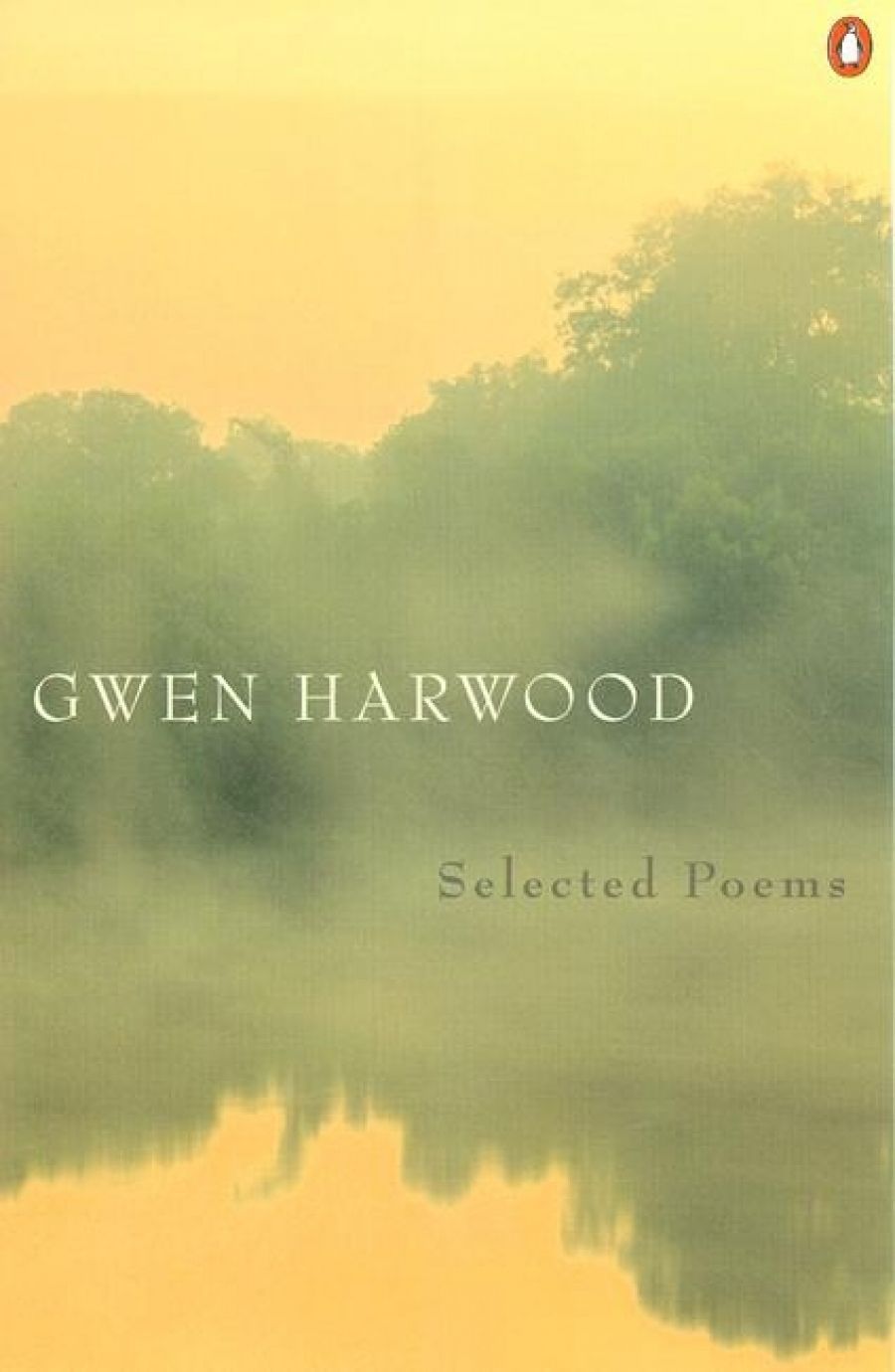
- Free Article: No
- Contents Category: Poetry
- Review Article: Yes
- Online Only: No
- Custom Highlight Text:
Although her work is often surprisingly varied, there is no doubt that when you read a Gwen Harwood poem you enter a highly distinctive poetic world. If it comes from her first twenty-five years of productivity, there is a good chance that you will be in a landscape of psychic melodrama. Everything will be liminal. The setting will be a sunset, the late sun will be flaring a dangerous gold on some intertidal stretch, the protagonist will have awoken from a menacing dream or, pace Kröte, be moving backwards and forwards across the threshold of one. The history of her poetry may be the way this scene increases in intensity as the voices that communicate in dreams increasingly come from figures in Harwood’s own past.
- Book 1 Title: Selected Poems
- Book 1 Subtitle: A new edition
- Book 1 Biblio: Halcyon Press, $16.95 pb, 256 pp
- Book 1 Readings Link: booktopia.kh4ffx.net/DD7Gj
There are many freakish things about the life and works of Gwen Harwood. To begin with, there are her other selves. Walter Lehmann, Francis Geyer, Miriam Stone, and Timothy Klein are not exactly Pessoa-like other identities, but they are certainly more than mere pseudonyms. Francis Geyer and Walther Lehmann are, it has always seemed to me, rather better poets than the early Gwen Harwood – more relaxed, perhaps – whereas Stone and, especially, Klein are over-the-top creatures, the latter teetering on the edge of parody. There are also the other selves of her continuously returned-to sequences: Eisenbart and Kröte. The first is an intellectual aristocrat and the second an artistic one, both adrift in the provinces. Though Kröte is the more lovable of the two, it is hard not to think of Eisenbart as a kind of lightning rod that draws off for its author the more dangerous, misanthropic side to the frustrations of intellectual superiority.
Then there is the extraordinary critical devotion she has inspired. There are four monographs about her work, a biography and collected poems are in the pipeline, and there is this new Selected Poems, edited by Gregory Kratzman. For an Australian poet, four monographs is a result that in other forms of endeavour might lead to a swabbing, so alarmingly does it outperform competitors like Dorothy Hewett, David Malouf, Bruce Beaver, and any number of others.
Clearly, she was a friend of a special kind: unsentimental but rhapsodic, perhaps. But the poetry gives clearer insights. One of its features – especially in the great, later poetry of Bone Scan and The Present Tense – is a kind of intimacy that is unique. Some of it derives from her material: hers is always a life in which the past visits the present as dream, the guilt and pain openly shared without dramatisation or hysterics. Some of it derives from her distinctive tone of voice, simultaneously playful, cultured and allusive. It embraces readers as friends and intimates, but always seems to promise to spare us, as much as possible, the agonies.
Her ‘monographers’ – Elizabeth Lawson, Stephanie Trigg, Alison Hoddinott, and Jennifer Strauss – know the poetry far better than I do, but, as an enthusiastic Harwood amateur, I cannot help but feel that she is more herself in the early and late poems rather than in her middle period. The Lion’s Bride and the selection of poems from 1969 to 1974 in the 1975 Selected Poems have always seemed to me to contain her least interesting work, while Bone Scan and The Present Tense contain her best. This probably comes from a prejudice, in my case, in favour of poetry of personal trauma over a poetry of playful and graceful philosophical speculation, even if this is a dance performed above the abyss.
Gregory Kratzmann’s new selection is a good one. It is cleanly and unfussily presented and has a number of scholarly grace-notes that are unusual in work on contemporary Australian poetry: it restores some original titles, re-establishes noms de plume and includes some uncollected poems. All it lacks is an index of poem titles. Again, as a Harwood amateur, I am struck by only a couple of Kratzmann’s choices. Like all Harwood selections, it includes what seems to me to be a really bad poem, ‘Barn Owl’, in which the guilt-theme of childhood cruelty to animals, explored so movingly in later poems such as ‘The Secret Life of Frogs’ and ‘Class of 1927’, is reduced to the level of cliché (and an American, adolescent, rites-of-passage cliché at that).
Conversely, it doesn’t include my favourite Harwood poem, ‘Midwinter’, from The Present Tense, in which her beloved Brisbane sends her a message in her dying years in the form of a second-hand edition of a commentary on Job. She (and her grandmother) had been misreading it all along. When Job says, ‘Though he slay me yet will I trust in him’, he really means, ‘If he kills me he will have to do it with me looking in his face’. Perhaps not everybody shares my admiration for this poem, but to me it is an unaccountable omission in an otherwise excellent and eminently usable selection.


Comments powered by CComment